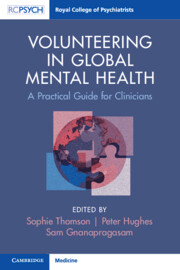Book contents
- Volunteering in Global Mental Health
- Reviews
- Volunteering in Global Mental Health
- Copyright page
- Contents
- Foreword
- Contributors
- Introduction
- Section 1 Key Principles, Theory and Concepts
- Section 2 Practical Guide and Toolkit
- Section 3 Reflective Accounts and Perspectives of Global Mental Health Volunteering
- Chapter 12 Myanmar: Mental Health Training, Recipient Perspective
- Chapter 13 Myanmar: Mental Health Training, Trainer Perspective
- Chapter 14 Somaliland: Mental Health Training, Recipient Perspective
- Chapter 15 Somaliland and Malawi: Mental Health Training, Trainer Perspective
- Chapter 16 Zimbabwe: Diaspora Perspective of Volunteering
- Chapter 17 Sierra Leone: Capacity Building, Trainee Perspective on Volunteering
- Chapter 18 Chad, Darfur, Haiti, Sierra Leone and Bangladesh: Humanitarian Field Experiences
- Chapter 19 Sudan: Mental Health Training, mhGAP Trainer Perspective
- Chapter 20 Kashmir: Mental Health Training, Royal College of Psychiatrists’ VIPSIG Training Programme
- Chapter 21 Ghana: Supervisor Perspective, RCPsych Volunteer Programme
- Section 4 Future of Global Volunteering
- Book part
- Glossary
- Index
- References
Chapter 20 - Kashmir: Mental Health Training, Royal College of Psychiatrists’ VIPSIG Training Programme
from Section 3 - Reflective Accounts and Perspectives of Global Mental Health Volunteering
Published online by Cambridge University Press: 08 November 2023
- Volunteering in Global Mental Health
- Reviews
- Volunteering in Global Mental Health
- Copyright page
- Contents
- Foreword
- Contributors
- Introduction
- Section 1 Key Principles, Theory and Concepts
- Section 2 Practical Guide and Toolkit
- Section 3 Reflective Accounts and Perspectives of Global Mental Health Volunteering
- Chapter 12 Myanmar: Mental Health Training, Recipient Perspective
- Chapter 13 Myanmar: Mental Health Training, Trainer Perspective
- Chapter 14 Somaliland: Mental Health Training, Recipient Perspective
- Chapter 15 Somaliland and Malawi: Mental Health Training, Trainer Perspective
- Chapter 16 Zimbabwe: Diaspora Perspective of Volunteering
- Chapter 17 Sierra Leone: Capacity Building, Trainee Perspective on Volunteering
- Chapter 18 Chad, Darfur, Haiti, Sierra Leone and Bangladesh: Humanitarian Field Experiences
- Chapter 19 Sudan: Mental Health Training, mhGAP Trainer Perspective
- Chapter 20 Kashmir: Mental Health Training, Royal College of Psychiatrists’ VIPSIG Training Programme
- Chapter 21 Ghana: Supervisor Perspective, RCPsych Volunteer Programme
- Section 4 Future of Global Volunteering
- Book part
- Glossary
- Index
- References
Summary
Arriving alone at Srinagar airport, I felt very far from the planning meeting held in London. It seemed an act of faith that I would find my hosts and destination. My faith was rewarded quickly when my two hosts picked me from the passengers at arrivals. Sadly, there are not many European visitors to Kashmir these days, while its political situation remains unresolved. They greeted me warmly and escorted me to a car and driver who would take me to the education centre at Dobiwan, where our course was to be held. On the way there, the driver took a series of phone calls. He informed me that we would have to make a diversion to avoid ‘pelting’ on our planned route. I had arrived on the day of a demonstration following an incident between the Indian army and local youths. Protesters had lined the roadside of major routes, including ours, ready to pelt with stones any vehicle foolhardy enough to try to pass. We used a disguised vehicle to travel to our residence.
- Type
- Chapter
- Information
- Volunteering in Global Mental HealthA Practical Guide for Clinicians, pp. 183 - 187Publisher: Cambridge University PressPrint publication year: 2023



